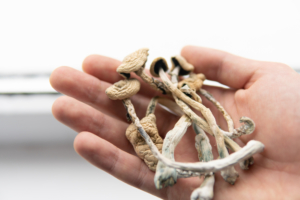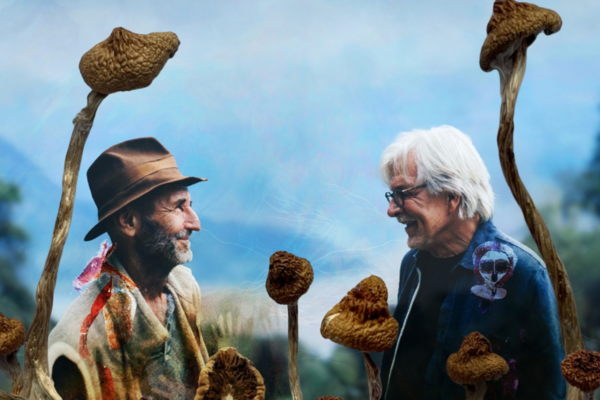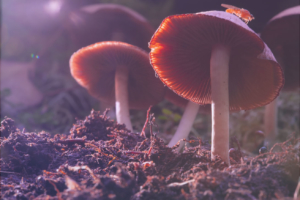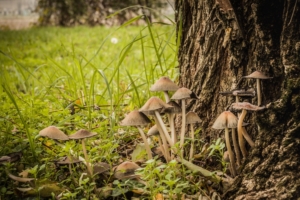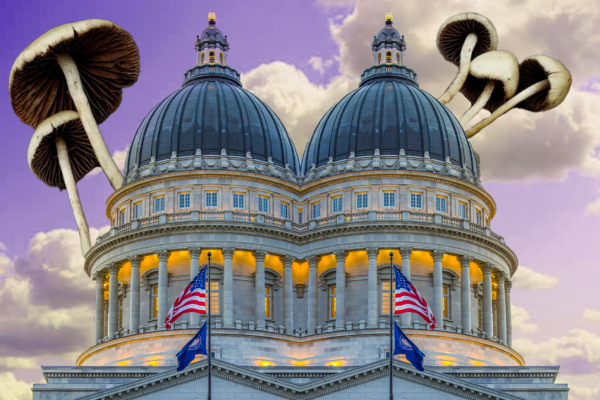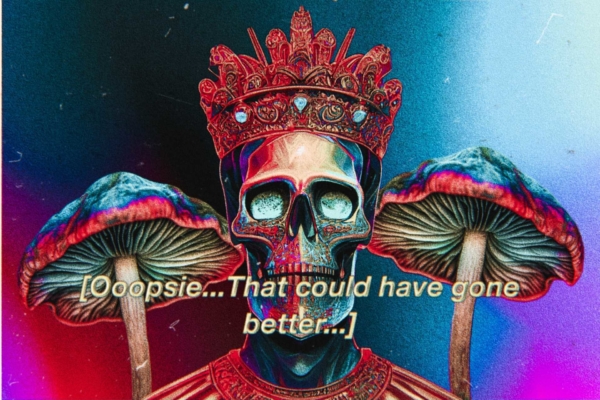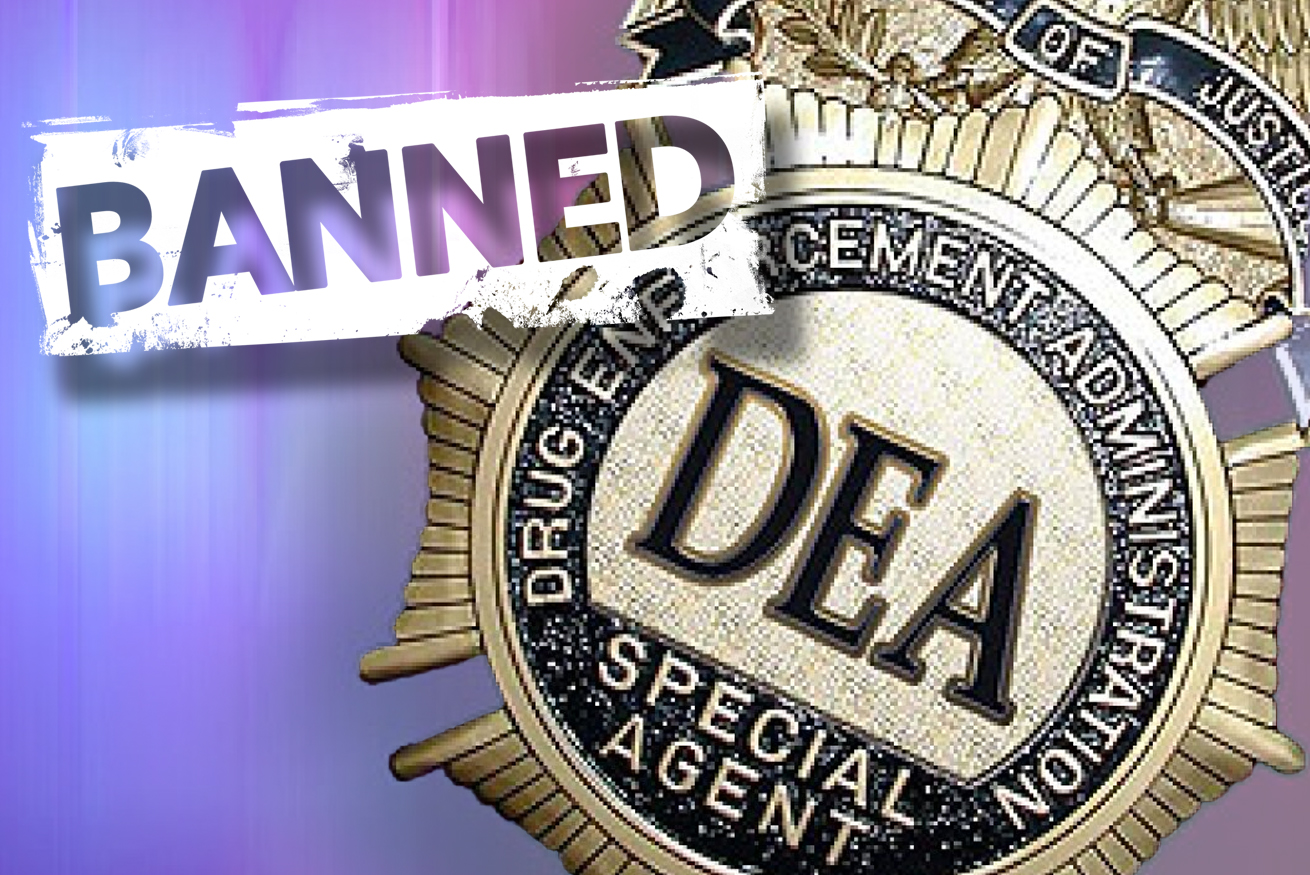
Sometimes you just can’t fight nature. A lion will hunt gazelle. A mosquito will bite you. And the US Drug Enforcement Agency (DEA) will ban psychedelic drugs with zero evidence that they are harmful, addictive, or pose any dangers to society.
After recently backing down from criminalizing five obscure psychedelics, the DEA is now moving to ban two more little-known hallucinogens, DOI and DOC, placing them into Schedule 1. Drugs in Schedule 1 are not only illegal to consume or sell, they are also considered so dangerous that extreme limits are even put on scientists researching them.
DOI (dimethoxy-4-iodoamphetamine) and DOC (2,5-dimethoxy-4-chloroamphetamine) are hallucinogens first synthesized by legendary psychedelic researcher, Alexander Shulgin. Though little research has been done into the psychedelics, both are said to have subjective effects similar to LSD, though the durations can be significantly longer at 12-24 hours, and the experience is said to feel more energetic.
So, if the DEA is attempting to place these two psychedelics in Schedule 1, criminalizing people who use them recreationally and placing strict limits on scientists who wish to study DOI and DOC, they must have some pretty solid evidence that these drugs are a menace to society, right?
Indeed, in their written proposed rule change, where they walk through the rationale for banning the hallucinogens, they conclude by saying that the “DEA finds that these facts and all relevant data constitute substantial evidence of potential for abuse of DOI and DOC. As such, DEA proposes to schedule DOI and DOC as controlled substances.”
The only problem? The word “potential” seems to do all the heavy lifting in their analysis. In fact, throughout the DEA’s actual analysis of the recorded harms of these two substances, we constantly see sentences such as these:
“To date, there are no reports of distressing responses or death associated with DOI in medical literature.”
Translation: We have ZERO evidence that DOI is unsafe to consume.
“The physiological dependence liability of DOI and DOC in animals and humans is not reported in scientific and medical literature.”
Translation: We have ZERO evidence that DOI and DOC are addictive.
“Anecdotal reports on the internet indicate that individuals are using substances they identified as DOI and DOC for their hallucinogenic effects,” which means that “it is reasonable to assume that DOI and DOC have substantial capability to be a hazard to the health of the user and to the safety of the community.”
Translation: People ON THE INTERNET talk about using these recreationally, therefore they must be dangerous.
To be fair, in the USA there has been one person in the last 17 years who died while using DOC “in combination with other drugs.” Two others have likewise been hospitalized for combining DOC with other drugs.
What drugs? The DEA doesn’t tell us. Could it have been fentanyl? Cocaine? Heroin? Some other opioid that is much more addictive and deadly than psychedelics? While the DEA (intentionally?) doesn’t say, I see it as the most likely scenario.
There have also been two reported deaths internationally, though we were given zero further information, including whether they also died with other more deadly drugs in their systems.
So to recap, the DEA is banning two little-known psychedelics that Shulgin first synthesized, when they have zero evidence that they are addictive, and only the flimsiest incomplete evidence that one of them may have played a contributing factor —when combined with other mystery drugs— to one death in the USA.
Why?
Well, the primary logic goes as follows. DOI and DOC are chemically related to other psychedelics, such as LSD, DMT, and DOM. These drugs are currently illegal and therefore must be dangerous —even though the DEA also admits that “hallucinogens are not usually associated with physical dependence.” If drugs like LSD are illegal, we must OBVIOUSLY also make DOI and DOC illegal, regardless of the evidence.
Furthermore, the United Nations believes that DOC —but apparently not DOI— should be made illegal, and we have to listen to the UN! After all, the US is a signatory to the 1971 Convention on Psychotropic Substances, which is a treaty globalizing the War on Drugs.
Never mind the fact that the USA both started and currently leads the War on Drugs, and that it could easily lead a coalition of countries to end it if it chose to do so. Or, alternatively, they could just pull out of the convention.
But no, the USA couldn’t do that. After all, America always, always, always, listens to the UN! (Always, always, always).
So in other words, the DEA is hiding behind the UN to justify its further criminalization of psychedelics, even though the international body only suggests they ban one of the two drugs they are attempting to make illegal.
So, where do we go from here?
Luckily, there are those who are fighting this potential injustice. For example, the company Panacea Plant Sciences and a group of researchers out of Emory University are currently fighting this proposed rule change in court.
Over email, Panacea CEO David Heldreth told me that several weeks ago they “secured a procedural victory… which gives 30 days for the DEA to respond to my motion for them to publish a notice or potentially stay the hearings.” This means the DEA must respond by August 29th, “and then the judge will rule on my motion which likely will… stay the case for another month or so into October for the DEA to comply. Then likely another month or 2 before a hearing, so potentially no hearing until early January 2023.” He also asked the judge to force the DEA to “publish a new notice of the exact hearing date, time and place per law and allow new participants to join the hearings for DOI/DOC scheduling attempt.”
If this motion is unsuccessful, prehearing statements will happen September 23rd and the hearing would likely occur in November or December.
When asked why he thought this case was important to pursue, David told me, “We must fight to ensure access to these compounds as tools to study the mind, heal people and to protect the freedom of our country from agency overreach and the drug war. These compounds are invaluable to science. DOI is the strongest known compound for 5-HT2A and so it’s used as a standard to measure new compounds against. Beyond that, studies also show the potential for DOI and DOC as asthma, pain and inflammation treatments as well.”
As for the likelihood of them winning and the DEA backing down, David said, “I think we have probably 60-40 odds right now at the administrative court level. Our recent win in the tryptamine case gives me high hopes that we can achieve a similar result this time. The international scheduling angle will add a little bit of complexity to this case.”
And finally, when asked if there was anything a regular person could do to help, David told me, “the average person can help by writing their elected federal representatives in the House or Senate as well as the White House and let them know that you do not agree with the actions of the DEA, and that you’d like your representatives and the White House to pressure the DEA to end their actions against DOC, DOI, psychedelics, cannabis, etc at large.
“While court battles are key, the court of public opinion can also change policy.”
